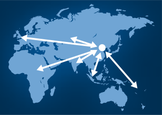IAA Annual Conference 2023
Penn Carey Law International Arbitration Association Annual Conference “The Re-Assertion of the State in International Arbitration”
March 24, 2023
Co-sponsored by Wilmer Hale, the Comparative Law Association and the International Law Society at Penn, as well as the ICC Young Arbitration & ADR Forum (YAAF).
Registration here.
While international arbitration has been developed as a safe haven from judicial interference in cross-border commercial disputes and an attractive alternative to “gunboat diplomacy” in foreign investment disputes, recent developments suggest a reassertion of the State in international arbitration.
Panel 1: The Role of State-Owned Enterprises In International Arbitration | 9:30 - 10:45 AM
International arbitration is used by state-owned enterprises pursuing strategic geopolitical interests, such as Chinese state-owned enterprises as part of the Belt and Road Initiative. This panel will evaluate how state-owned enterprises should be treated by arbitral tribunals in both ISDS and commercial arbitration. When should they be treated as sovereign actors? What are the downstream consequences of state-owned enterprises resorting to international arbitration at the enforcement stage?
Moderated by: JACQUES DELISLE, Professor of Law, Penn Carey Law
Panelists:
PAVLO BYELOUSOV, Head of International Arbitration and Cross-Border Litigation, AEQUO Law Firm, Kyiv
MATTHEW ERIE, Associate Professor, University of Oxford
CHRISTOPHER P. MOORE, Co-Head of Global International Arbitration, Cleary Gottlieb, London
STANLEY U. NWEKE-EZE, Managing Counsel, Templars (Nigeria); PhD Candidate, The University of Hong Kong
Panel 2: The New Generation of International Investment Agreements | 11:00 AM - 12:15 PM
New international investment agreements (IIAs) suggest that investment protection will have to accommodate increased space for states to regulate their economies, especially in the face of crises demanding immediate action such as the climate crisis. This panel will evaluate what the re-assertion of states’ rights to regulate means for ISDS and how the repoliticization of investor-state disputes might affect ISDS in practice.
Moderated by: BETH SIMMONS, Professor of Law, Penn Carey Law
Panelists:
WOLFGANG ALSCHNER, Hyman Soloway Chair in Business and Trade Law, University of Ottawa
LISE JOHNSON, Counsel, Curtis, Mallet-Prevost, Colt & Mosle LLP, London
MARK A. LUZ, General Counsel, Canadian Trade Law Bureau
LISA SACHS, Director, Columbia Center on Sustainable Investment
JEREMY K. SHARPE, Arbitrator; Consultant; Lecturer in Law & Senior Fellow, Columbia Law School; Board Member, UNRoD
Panel 3: International Arbitration as a Tool of Foreign Policy: The Weaponization of International Arbitration | 1:45 - 3 PM
In parallel to the revamp of investment protection rules, ISDS and international arbitration more generally are increasingly used directly by the states, both as a result of geopolitical conflicts and competition in a global economy. This panel will evaluate what the implications are of ISDS being used as a tool of foreign policy.
Moderated by: WILLIAM BURKE-WHITE, Professor of Law, Penn Carey Law
Panelists:
PARIS ABORO, Senior Associate, Covington & Burling, NY
ERIC CHANG, Principal, Chang Law; U.S. JAG Corps Officer, LA
STEPHAN SCHILL, Professor of International and Economic Law and Governance, Faculty of Law, University of Amsterdam
CHIARA GIORGETTI, Professor of Law, University of Richmond Law School; Senior Fellow, International Claims and Reparations Project, Columbia University Law School
Panel 4: Corruption Issues at the Enforcement Stage | 3:15 – 4:30 PM
Finally, corruption issues are becoming increasingly prevalent in arbitration proceedings. Such issues are increasingly raised in commercial arbitration and ISDS, even though jurisdictions take varying approaches to the review of arbitral findings of corruption (or the absence of any such findings) at the enforcement stage. Unlike previous panels evaluating the consequences of a re-assertion of the state in international arbitration, the last panel will ask whether states should play a more active role in settling corruption issues.
Moderated by: CLAUDIO SALAS, Special Counsel, WilmerHale, NY; Lecturer in Law, Penn Carey Law
Panelists:
JAMES BOYKIN, Chair of International Arbitration, Hughes Hubbard & Reed, Washington, D.C.
ERICA FRANZETTI, Partner, King & Spalding, Washington, D.C.
KATIE GONZALEZ, Senior Associate, Cleary Gottlieb, NY
ANSELMO REYES, International Judge, Singapore International Commercial Court (SICC)



